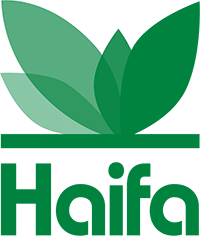Tal [00:00:07-00:00:00]
Welcome everybody. This is Tal from Haifa Israel, headquarter based in Haifa. I welcome Ronald from Holland to speak with us about blocked drippers.
Ronald [00:00:19-00:02:15]
Thank you very much Tal. Yeah, I told you the story already earlier, but I shall now tell you everything about it. I was a few weeks ago, I was visiting a grower and this grower was explaining that he had some dead plants in the greenhouse. We went in the greenhouse together and we were searching for the dead plants and that was not so difficult because we saw a lot and we found out that the drippers were completely blocked. We started investigating deeper and it's quite easy if there's sedimentation in your dripping lines, you can check it quite easy. You open the dripping line, put your finger in and if you're feeling that it's sandy, then there is sedimentation inside and that was the goal, that was the thing that we saw there. I advise the grower to start with our product Grow Clean. Well, it's a product based on polyphosphates and this polyphosphate can take away the sedimentation in the drippers and in the tubes. Unfortunately, if a dripper is completely blocked, we cannot open it anymore. But if it's still dripping a little bit, we can completely open it again by using this product. We start with the Grow Clean and the first thing before we started, I asked the grower, please look on your computer and check the flow from your drippers because the flow indicates if your dripping system is clean or not. And the flow was measured by a certain amount of liters per minute that was going into the system. Three weeks later, I visited him again. He added Grow Clean these three weeks. I visited him again. We went to the computer and we saw that the flow was increasing a lot, increased a lot. We went also in the greenhouse and we saw that there were no blocked drippers anymore and all drippers give more or less the same amount of water. And that was already mentioned happening in three weeks. For me, it's a very easy product because I can say to the growers, check it by yourself.
Tal [00:02:17-00:02:21]
Ronald, can you tell us and explain a little bit more what are the dosages that are being used by this product?
Ronald [00:02:24-00:03:11]
Yeah, we started these three weeks with 22 kilograms of Grow Clean in a 1000-liter tank, 100 times concentrated. So that means in total 100,000 litter water going into the greenhouse. That is the starting concentration when the system is dirty. After these three weeks, we changed from 22 kilogram to 11 kilogram just to keep the system clean. At the same time, in the start, we lowered the amount of monopetassium phosphate by 14 kilograms and the potassium nitrate by 7 kilograms. But later on, when we went to the 11 kilogram Grow Clean, we didn't change anything in the recipe anymore with MKP and potassium nitrate. We gave a little bit more phosphate, a little bit more nitrate, but that is a small figure. That is not so important.
Tal [00:03:13-00:03:26]
Can you say that in this way that you did this very easy operation and changing a little bit the recipe, you made something very good for the greenhouses that without water, the plant couldn't grow and nothing can go well in this situation?
Ronald [00:03:28-00:03:49]
Absolutely. The steering for the grower was way easier because before he saw some very wet plants that were where the drippers were still open and he saw some very dry plants. Then it is very difficult to decide, do I need to give more water or less water? Because if you give more water, the wet plants are becoming even too wet and the dry plants.
Tal [00:03:51-00:03:56]
When you use those polyphosphates, do you see also a change in the quality of the fruits or flowers that the grower is growing?
Ronald [00:03:58-00:04:25]
What we saw was that the plants were growing more homogeneous and more homogeneous growth, better growth, give at the end also a higher yield. By giving every plant the same amount of water, steering became easier and also the production of the plants became more equal. Okay. I think it's very nice and I think it sounds like you really helped this grower to finish the season in well manner and with profit.
Tal [00:04:27-00:04:37]
Absolutely. I can only invite growers who have the same experience in their greenhouse, please contact us. We can help you to solve this problem very easy and to grow a better yield.
Ronald [00:04:39-00:04:44]
Thank you very much, Ronald. I think it was very, very interesting to hear all that you said and very helpful for a lot of growers.
Tal [00:04:46-00:04:51]
Thank you, Tal. It was a pleasure to be in your podcast. Thank you very much and see you later. Bye, bye.
HaifaStream: Clogged drippers - more common than you think. Yes, theres an easy solution
Partcipants
Tal Shani (Interviewer) & Ronald Valke
Transcript of the episode
More Agriculture Podcasts







